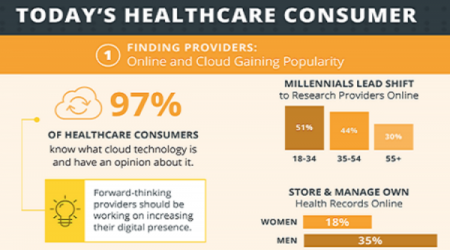
Health consumers have become savvy about the role of technology in their healthcare, according to a survey from Ambra, a company that is in the health cloud business.
The survey paints a picture of health consumers hungry for digital health connections.
The most popular activities patients do online for health were:
- To research symptoms and treatments
- To renew and/or fill prescriptions
- To view lab reports
- To make appointments
- To pay medical bills
- To correspond with the nurse or doctor
- To view imaging reports
- To get virtual care, and,
- To participate in patient communities.
To meet patients where they want to be — increasingly, online — Ambra recommends that healthcare providers increase their digital presence, welcome online reviews, and create digital self-service tools.
Given patients’ keenness to manage healthcare activities online, there is still frustration about personal medical record access and ease of scheduling. 1 in 3 consumers surveyed said they could not easily access their medical records. Among those who said they could, only 50% could do this via online access offered by providers. 39% maintained their own records systems.
When people do keep track of their own records for themselves and the family, the most common areas managed are:
- Vaccine records
- Prescriptions
- Diagnostic imaging
- Physician notes, and
- Blood tests.
Healthcare stakeholders should note that most consumers consider medical access and ease of scheduling when shopping for healthcare, across the age groups.
The survey was conducted in Q2-2017 among 1,136 U.S. adults over 18 who have received medical imaging services. This is a unique lens for a health consumer sample: note that Ambra Health is in the medical imaging cloud business.
Health Populi’s Hot Points: The mainstream U.S. health consumer is increasingly tech-savvy and -trusting, engaged with shopping for and taking on more self-care, the Ambra poll shows.
But Ambra uncovered an ongoing challenge: more consumers found it easier to track maintenance and service records for their vehicles than for their dependents — a particular vexing problem for more women in the study. Ambra recommended looking at models of Netflix and Verizon for family-share options with easy online access.
This is sound advice: consumers want enrolling in health insurance plans to feel more like an Amazon ecommerce experience than a typical, painful, hassle-ful insurance sign-up, Aflac recently found in their own consumer survey.
We’ll be discussing health care shopping and patient engagement on Tuesday at Health 2.0, when I’ll have the joy of speaking on the main stage with David Vivero, CEO of Amino Health. That’s one company looking to light up the un-transparent space between healthcare providers and consumers looking to make rational economic and clinical decisions about health services for themselves and their loved ones.




 Thank you FeedSpot for
Thank you FeedSpot for